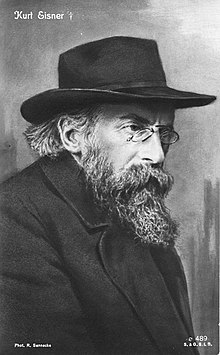Kurt Eisner | |
|---|---|
 | |
| Minister President of the People's State of Bavaria | |
| In office 8 November 1918 – 21 February 1919 | |
| Preceded by | Otto Ritter von Dandl (as Chairman of the Council of Ministers) |
| Succeeded by | Johannes Hoffmann |
| Personal details | |
| Born | 14 May 1867 Berlin, Brandenburg, Prussia |
| Died | 21 February 1919 (aged 51) Munich, Bavaria |
| Nationality | German |
| Political party | Independent Social Democratic Party of Germany (1917–1919) Social Democratic Party of Germany (1898–1917) |
Kurt Eisner (German pronunciation: [kʊʁt ˈʔaɪsnɐ]; 14 May 1867 – 21 February 1919)[1] was a German politician, revolutionary, journalist, and theatre critic. As a socialist journalist, he organized the socialist revolution that overthrew the Wittelsbach monarchy in Bavaria in November 1918, which led to him being described as "the symbol of the Bavarian revolution".[2][1] He is used as an example of charismatic authority by Max Weber.[3] Eisner subsequently proclaimed the People's State of Bavaria but was assassinated by far-right German nationalist Anton Graf von Arco auf Valley in Munich on 21 February 1919.
- ^ a b "Kurt Eisner – Encyclopædia Britannica" (biography), Encyclopædia Britannica, 2006, Britannica.com webpage: Britannica-KurtEisner Archived 4 November 2007 at the Wayback Machine.
- ^ "The German Revolution's Bloody End".
- ^ Max Weber, (London 1987) p. 634